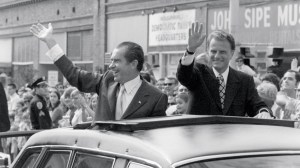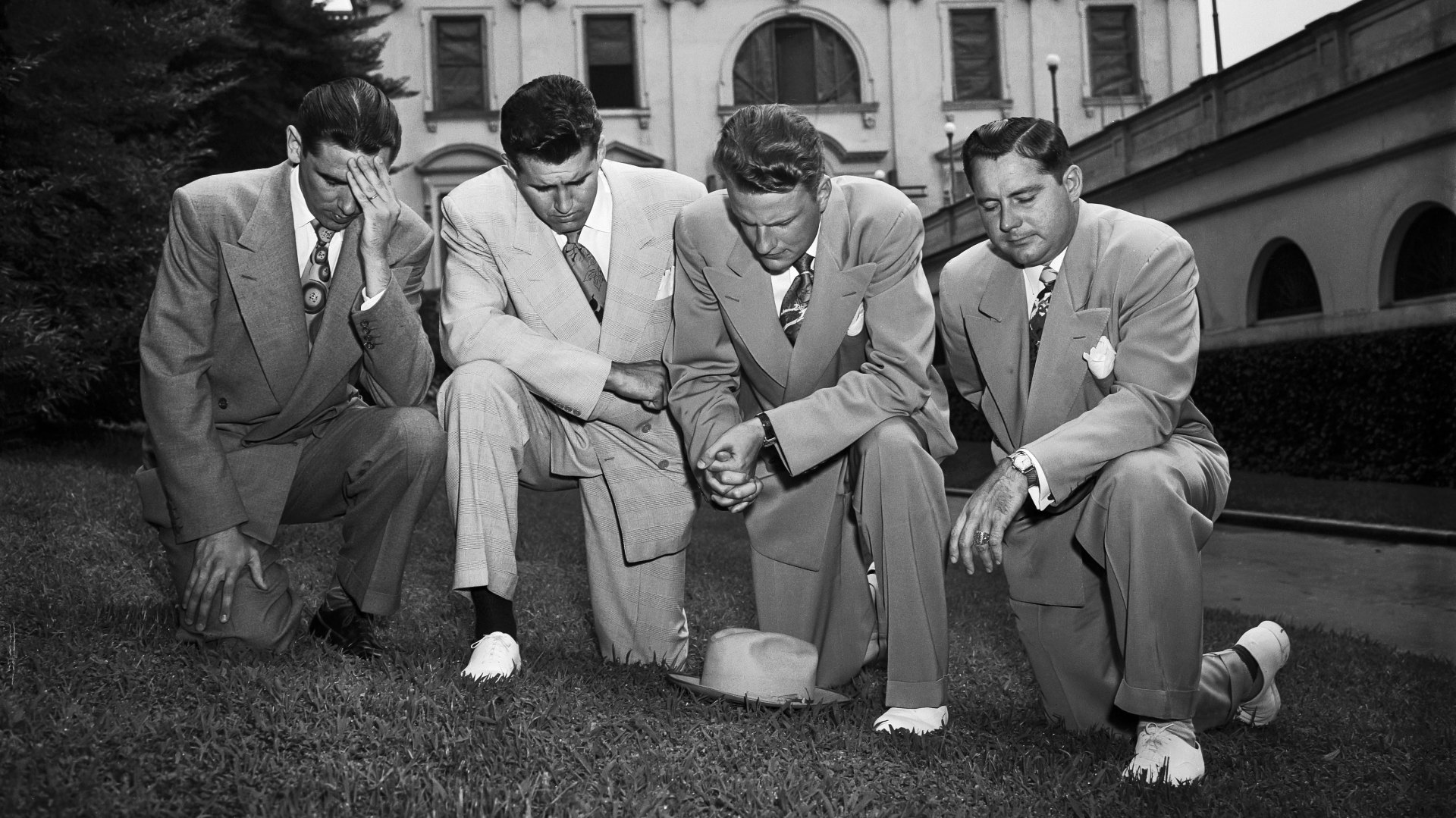For all of Billy Graham's remarkable accomplishments, he made his share of mistakes. These mistakes might have harmed his ministry if not for Graham's willingness to confess them and learn from them.
“I've had to admit errors in judgment, and I've found Christian people more than generous in understanding my faults,” he told Christianity Today during the throes of Watergate in 1974. “It's better to show humility, and it's better to say ‘I'm wrong’ or ‘I'm sorry’ when you've made a mistake. … However, some of the criticism hurled at evangelical theology lands on me, and I suppose when I make a mistake it hurts the evangelical cause. I sometimes put my foot in my mouth. I've made many statements I wish I could recall. I am an erring, fallible disciple of our Lord Jesus Christ and am subject to all the temptations, human frailties, and errors of other disciples of the Lord.”
Kneeling on the White House Lawn
Graham would never again repeat his first big public mistake, which followed a 1950 meeting with Harry Truman, Graham's first opportunity to meet a president.
“When we arrived at the side gate of the White House, we passed through the security guards and checkpoints easily enough,” Graham remembered in the opening of his autobiography, Just As I Am. “The President's secretary then took us in hand, informing us that our visit would last exactly 20 minutes. Promptly at noon, we were ushered into the Oval Office. From the look on President Truman's face, the chief executive of our nation must have thought he was receiving a traveling vaudeville team.
“When we stepped outside the White House, reporters and photographers from the press corps pounced on us. … Before I could respond, an enterprising photographer asked us to kneel on the lawn and reenact the prayer. The press corps roared its approval. I declined to repeat the words we had prayed in the Oval Office, but I said that we had been planning to thank God for our visit anyway, and now was as good a time as any. The four of us bent one knee of our pastel summer suits, and I led the prayer of thanksgiving as sincerely as I could, impervious to the popping flashbulbs and scribbling pencils.
Graham's relationship with Nixon haunted his reputation from Watergate on. But as he aged, he more often lamented being away from his family so often.
“It began to dawn on me a few days later how we had abused the privilege of seeing the President. National coverage of our visit was definitely not to our advantage. The President was offended that I had quoted him without authorization, Drew Pearson observed in his syndicated column, and now I was persona non grata at the White House. And Pearson was right. Mr. Truman never asked me to come back. … After our gaffe, I vowed to myself it would never happen again if I ever was given access to a person of rank or influence.”
Too Close to Dick Nixon
Graham's most distressing embarrassment also concerned a president, his close friend Richard Nixon. Listening to tapes of Nixon's dark side shocked Graham and permanently changed his relationship with politicians.
 BGEA
BGEA“As he settled into his new role, Nixon—whom I no longer addressed as Dick but as Mr. President—took me up on my offer,” he said in Just As I Am. “In the interest of confidentiality, I stopped keeping written notes of our conversations. But, unknown to me, he did keep a record, not only of our conversations but also of staffers' suggestions that might involve me. He might have taped some of our conversations as well, without my knowledge or consent. I could wish it otherwise. Some of these exchanges—whether including me directly or involving me peripherally—are on public record in the media or open for inspection in libraries. Some of them appear in Nixon's own books.
“It was naïve of me, I suppose, to think that such a close relationship with a President would never be used to serve his political ends. But searching my soul now, I honestly believe my intentions were uncomplicated by personal aims or ambitions.”
The experience caused Graham to pause before offering political advice to subsequent presidents. “Inside the Beltway is a different world,” Graham said to biographer William Martin, author of A Prophet with Honor. “That's the reason I don't go there anymore if I can help it. I'm glad I live down here on these mountains. I don't go to Washington much, and I don't go to the Hill much. I used to have lots of friends that I'd go back and see—congressmen and senators—but for years I haven't done that. I just don't want to go. I feel God has called me to a much higher calling.”
“I came close to identifying the American way of life with the kingdom of God,” Graham told Christianity Today more than 10 years after Nixon resigned. “Then I realized that God had called me to a higher kingdom than America. I have tried to be faithful to my calling as a minister of the gospel.”
‘Study More, Preach Less’
But Graham never had an opportunity to correct some mistakes. He spoke about them in a 1977 interview with Christianity Today.
“One of my great regrets is that I have not studied enough. I wish I had studied more and preached less. People have pressured me into speaking to groups when I should have been studying and preparing. Donald Barnhouse said that if he knew the Lord was coming in three years he would spend two of them studying and one preaching. I'm trying to make it up.
“Also, I did not spend enough time with my family when they were growing up. You cannot recapture those years. I might add here that through the years I have met many, many people. I feel terrible that I cannot keep up with all those friends and acquaintances.
“I would not have encouraged the Billy Graham Evangelistic Association and its affiliates to get so big. We have been trying to cut back here and there without affecting the ministry God has called us to.”
Collin Hansen, a Christianity Today editor at large, is editorial director of The Gospel Coalition and was a researcher for The Leadership Secrets of Billy Graham (Zondervan).











